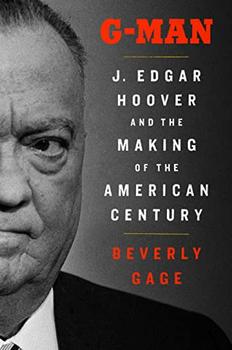
Critics' Opinion:
Readers' rating:
Published Nov 2022
864 pages
Genre: Biography/Memoir
Publication Information
A major new biography of J Edgar Hoover that draws from never-before-seen sources to create a groundbreaking portrait of a colossus who dominated half a century of American history and planted the seeds for much of today's conservative political landscape.
We remember him as a bulldog—squat frame, bulging wide-set eyes, fearsome jowls—but in 1924, when he became director of the FBI, he had been the trim, dazzling wunderkind of the administrative state, buzzing with energy and big ideas for reform. He transformed a failing law-enforcement backwater, riddled with scandal, into a modern machine. He believed in the power of the federal government to do great things for the nation and its citizens. He also believed that certain people—many of them communists or racial minorities or both— did not deserve to be included in that American project. Hoover rose to power and then stayed there, decade after decade, using the tools of state to create a personal fiefdom unrivaled in U.S. history.
Beverly Gage's monumental work explores the full sweep of Hoover's life and career, from his birth in 1895 to a modest Washington civil-service family through his death in 1972. In her nuanced and definitive portrait, Gage shows how Hoover was more than a one-dimensional tyrant and schemer who strong-armed the rest of the country into submission. As FBI director from 1924 through his death in 1972, he was a confidant, counselor, and adversary to eight U.S. presidents, four Republicans and four Democrats. Franklin Roosevelt and Lyndon Johnson did the most to empower him, yet his closest friend among the eight was fellow anticommunist warrior Richard Nixon. Hoover was not above blackmail and intimidation, but he also embodied conservative values ranging from anticommunism to white supremacy to a crusading and politicized interpretation of Christianity. This garnered him the admiration of millions of Americans. He stayed in office for so long because many people, from the highest reaches of government down to the grassroots, wanted him there and supported what he was doing, thus creating the template that the political right has followed to transform its party.
G-Man places Hoover back where he once stood in American political history—not at the fringes, but at the center—and uses his story to explain the trajectories of governance, policing, race, ideology, political culture, and federal power as they evolved over the course of the 20th century.
"Captivating...Nuanced, incisive, and exhaustive, this is the definitive portrait of one of 20th-century America's most consequential figures." —Publishers Weekly (starred review)
"A welcome reevaluation of a law enforcement legend." —Kirkus Reviews
"Revelatory...an acknowledgment of the complexities that made Hoover who he was, while charging the turbulent currents that eventually swept him aside." —The New York Times
"[A] crisply written, prodigiously researched, and frequently astonishing new biography" —The New Yorker
"Masterful…This book is an enduring, formidable accomplishment, a monument to the power of biography [that] now becomes the definitive work" —The Washington Post
"Gage's penetrating account of Hoover's career, especially his many long-eclipsed triumphs, offers a well-timed and sobering perspective as yet another institution in our fractured country struggles to maintain trust." —The Atlantic
"Gage's triumph is her deft navigation through Hoover's 'deep state,' while reminding us of the abuse of power that remains his enduring legacy." —The Boston Globe
"Gage has done a service to history with this clear-eyed portrait of a man who was, for better and for worse, very much an American of his century." —The American Scholar
"This is a monumental work about power, responsibility, and democracy itself. With deep research, an engaging voice, and penetrating insights, Beverly Gage has crafted a portrait of a man and a country in all its complexity and contradiction. To understand who we are, Gage argues, we need to understand the rise and reign of J. Edgar Hoover. And this book is now an indispensable element in the unending work of grasping the nature of our flawed nation." —Jon Meacham, Pulitzer Prize winner and author of American Lion: Andrew Jackson in the White House
This information about G-Man was first featured
in "The BookBrowse Review" - BookBrowse's membership magazine, and in our weekly "Publishing This Week" newsletter. Publication information is for the USA, and (unless stated otherwise) represents the first print edition. The reviews are necessarily limited to those that were available to us ahead of publication. If you are the publisher or author and feel that they do not properly reflect the range of media opinion now available, send us a message with the mainstream reviews that you would like to see added.
Any "Author Information" displayed below reflects the author's biography at the time this particular book was published.
Beverly Gage is professor of 20th-century American history at Yale. She is the author of The Day Wall Street Exploded, which examined the history of terrorism in the late 19th and early 20th centuries. She writes frequently for the New York Times, the Washington Post, the New York Times Magazine and The New Yorker, among other publications.





The House on Biscayne Bay
by Chanel Cleeton
As death stalks a gothic mansion in Miami, the lives of two women intertwine as the past and present collide.

The Flower Sisters
by Michelle Collins Anderson
From the new Fannie Flagg of the Ozarks, a richly-woven story of family, forgiveness, and reinvention.

The Funeral Cryer by Wenyan Lu
Debut novelist Wenyan Lu brings us this witty yet profound story about one woman's midlife reawakening in contemporary rural China.
Your guide toexceptional books
BookBrowse seeks out and recommends the best in contemporary fiction and nonfiction—books that not only engage and entertain but also deepen our understanding of ourselves and the world around us.